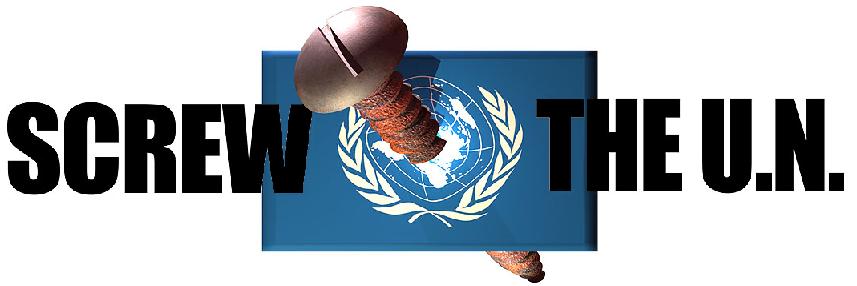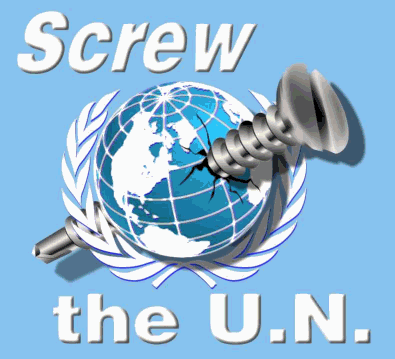Team Infidel
Forum Spin Doctor
USA Today
December 11, 2006
Pg. 1
Ends U.N. tenure with dig at Bush
By Barbara Slavin, USA Today
In a farewell speech on U.S. soil today, retiring United Nations Secretary-General Kofi Annan plans to deliver a tough critique of President Bush's policies. He will accuse the administration of trying to secure the United States from terrorism in part by dominating other nations through force, committing what he termed human rights abuses and taking military action without broad international support.
Though Annan has long been a critic of the war in Iraq and other Bush foreign policies, the planned speech is among his toughest and is unusual for a U.N. secretary-general concluding his tenure.
Annan's remarks, provided to USA TODAY by his office, list principles for international relations, among them "respect for human rights and the rule of law."
These ideas can be advanced only "if America remains true to its principles, including in the struggle against terrorism," the speech says. "When it appears to abandon its own ideals and objectives, its friends abroad are naturally troubled and confused."
In the 61-year history of the U.N., no secretary-general has ended his tenure by criticizing U.S. policies so sharply, said Stanley Meisler, a historian of the United Nations and author of a new biography of Annan.
Ric Grennell, spokesman for the U.S. mission to the U.N., said he would not discuss the remarks prior to their delivery. John Bolton, outgoing U.S. ambassador to the U.N., also declined to comment.
In his speech, Annan refers to the U.S.-led invasion of Iraq. When "military force is used, the world at large will consider it legitimate only when convinced that it is being used for the right purpose … in accordance with broadly accepted norms."
The speech continues that "governments must be accountable for their actions in the international arena, as well as in the domestic one."
The speech, to be delivered at the Harry Truman presidential library in Independence, Mo., contrasts Truman's support for the United Nations with the Bush administration's unilateral actions.
Annan acknowledges terrorism and other global threats but cautions against nations acting alone. "Against such threats as these, no nation can make itself secure by seeking supremacy over all others," the speech says.
Annan leaves office Dec. 31 and will be replaced by former South Korean foreign minister Ban Ki Moon.
Annan's predecessor, Boutros Boutros-Ghali, developed a personal hostility toward then-U.S. ambassador to the U.N. Madeleine Albright, but saved his anger for a book after he left office, Meisler said.
The United States supported Annan for the job 10 years ago, when it blocked Boutros-Ghali from serving a second five-year term. Annan has worked with the United States on a number of issues, including U.N. reform, said Lee Feinstein, a U.N. expert at the Council on Foreign Relations.
Critics of Annan in Congress, including Sen. Norm Coleman, R-Minn., faulted the Ghana-born, U.S.-educated diplomat for lax management of the $64 billion U.N. oil-for-food program. The 1996-2003 effort was tainted by $1.5 billion in kickbacks to the regime of Saddam Hussein.
"Annan's legacy will be one of missed opportunity and failed leadership," said Coleman, who urged Annan to resign last year.
December 11, 2006
Pg. 1
Ends U.N. tenure with dig at Bush
By Barbara Slavin, USA Today
In a farewell speech on U.S. soil today, retiring United Nations Secretary-General Kofi Annan plans to deliver a tough critique of President Bush's policies. He will accuse the administration of trying to secure the United States from terrorism in part by dominating other nations through force, committing what he termed human rights abuses and taking military action without broad international support.
Though Annan has long been a critic of the war in Iraq and other Bush foreign policies, the planned speech is among his toughest and is unusual for a U.N. secretary-general concluding his tenure.
Annan's remarks, provided to USA TODAY by his office, list principles for international relations, among them "respect for human rights and the rule of law."
These ideas can be advanced only "if America remains true to its principles, including in the struggle against terrorism," the speech says. "When it appears to abandon its own ideals and objectives, its friends abroad are naturally troubled and confused."
In the 61-year history of the U.N., no secretary-general has ended his tenure by criticizing U.S. policies so sharply, said Stanley Meisler, a historian of the United Nations and author of a new biography of Annan.
Ric Grennell, spokesman for the U.S. mission to the U.N., said he would not discuss the remarks prior to their delivery. John Bolton, outgoing U.S. ambassador to the U.N., also declined to comment.
In his speech, Annan refers to the U.S.-led invasion of Iraq. When "military force is used, the world at large will consider it legitimate only when convinced that it is being used for the right purpose … in accordance with broadly accepted norms."
The speech continues that "governments must be accountable for their actions in the international arena, as well as in the domestic one."
The speech, to be delivered at the Harry Truman presidential library in Independence, Mo., contrasts Truman's support for the United Nations with the Bush administration's unilateral actions.
Annan acknowledges terrorism and other global threats but cautions against nations acting alone. "Against such threats as these, no nation can make itself secure by seeking supremacy over all others," the speech says.
Annan leaves office Dec. 31 and will be replaced by former South Korean foreign minister Ban Ki Moon.
Annan's predecessor, Boutros Boutros-Ghali, developed a personal hostility toward then-U.S. ambassador to the U.N. Madeleine Albright, but saved his anger for a book after he left office, Meisler said.
The United States supported Annan for the job 10 years ago, when it blocked Boutros-Ghali from serving a second five-year term. Annan has worked with the United States on a number of issues, including U.N. reform, said Lee Feinstein, a U.N. expert at the Council on Foreign Relations.
Critics of Annan in Congress, including Sen. Norm Coleman, R-Minn., faulted the Ghana-born, U.S.-educated diplomat for lax management of the $64 billion U.N. oil-for-food program. The 1996-2003 effort was tainted by $1.5 billion in kickbacks to the regime of Saddam Hussein.
"Annan's legacy will be one of missed opportunity and failed leadership," said Coleman, who urged Annan to resign last year.




